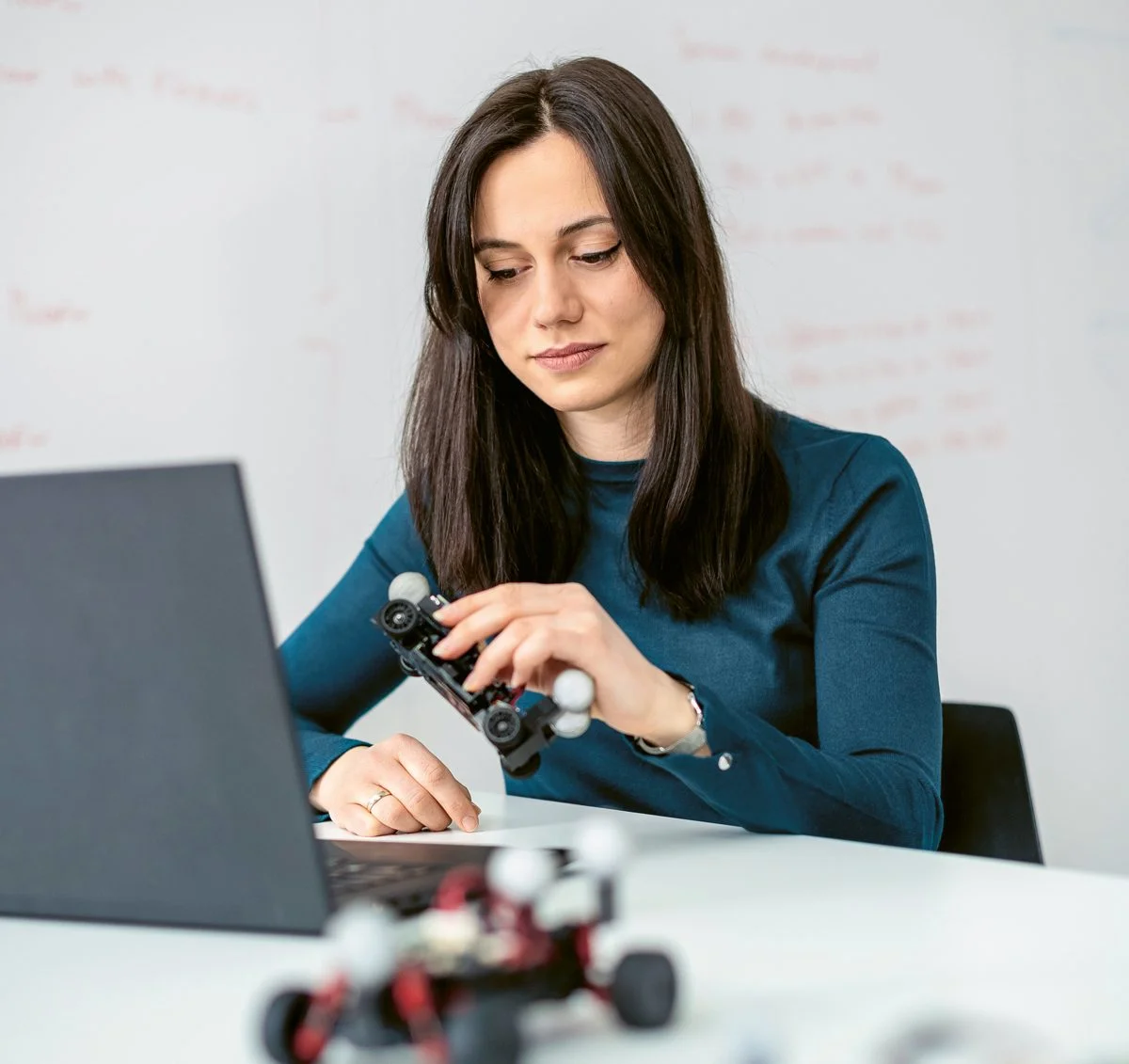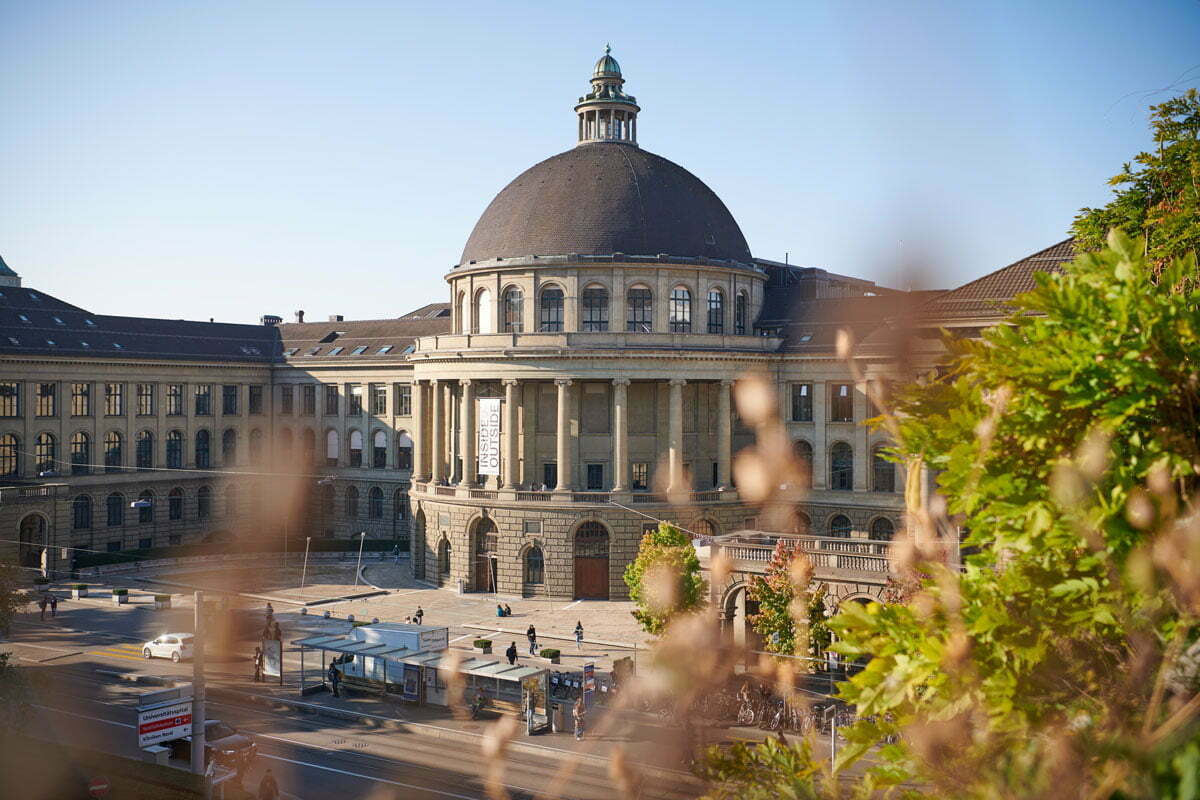At robot training camp
Robots that function reliably and independently: with her AI-based research, doctoral student Jelena Trisovic wants to help ensure that autonomous systems in the future provide us with the most effective support possible.

© ETH Foundation / Daniel Winkler
© ETH Foundation / Daniel Winkler
Getting self-driving toy cars to successfully navigate a mini-race track at high speed, or a robotic hand to transport an object from one place to another: behind the projects Jelena Trisovic is participating in are a variety of interlinked research questions. “I want to improve the interplay between perception and control in autonomous systems. Only then can the systems perform complex tasks in a challenging environment with the required autonomy and reliability,” the young researcher explains. Currently, most robots have two separate modules responsible for this: the perception module and the control module. The output of the perception module’s readings, such as a map, is forwarded to the control module, which tells the robot where to go and what to do. If the data it receives is incorrect, the robot is unable to perform its task as intended, because it cannot compare data between the modules.
This is of particular importance when it comes to search and rescue robots, for example. When deployed in disaster areas – and therefore in unfamiliar terrain – these robots must be able to process the sensor data and images they’re collecting and simultaneously use it to plan and execute their movements. In other words, the perception module and the control module must be able to coordinate consistently with each other. Jelena Trisovic is developing methods she plans to use on a mini-race track: here, self-driving toy cars have to race along an unknown route, while autonomously detecting and avoiding obstacles such as other cars.
Inspiration from interdisciplinary influences
The doctoral student is pursuing her research through a fellowship at the ETH AI Center, a hub which brings together more than 110 professors working on the foundations, applications and implications of artificial intelligence. Originally from Serbia, Jelena Trisovic came to ETH Zurich for her Master’s in electrical engineering and information technology and received support from an Excellence Scholarship. “Thanks to the scholarship, I was able to fully concentrate on my studies and benefit from an exciting community,” recalls the young scientist who, in addition to her exceptional skills in mathematics, is also passionate about learning languages – and holds a black belt in karate.
Towards the end of her Master’s programme, she applied for one of the coveted AI fellowships. She was among the two percent of all applicants to receive one of the spots. “I divide my time between the AI Center, Professor Melanie Zeilinger’s Intelligent Control Systems group, and Professor Fisher Yu’s Visual Intelligence and Systems group,” Jelena Trisovic explains. While Melanie Zeilinger’s lab focuses on the control of autonomous systems, Fisher Yu’s research group is concerned with perception systems. The interdisciplinary setting allows the doctoral candidate to approach her research questions from different perspectives and draw on comprehensive expertise.
Tapping into the full potential
With her research, Jelena Trisovic not only wants to help robots become better at mastering their tasks, but also ensure their safe deployment in unknown environments. To achieve this, being able to explain and thereby understand the approaches used, including deep neural networks, is crucial. “Because that’s the only way we can ensure that robots perform tasks as planned and cause no harm”, the researcher explains. Jelena Trisovic sees important potential applications for autonomous systems primarily in situations that are risky for humans: “When robots like Mars rovers take readings in space or when they locate – or even help recover – survivors after an earthquake, the benefit they bring to society is huge.” Some of these applications are already a reality, but there’s still a huge amount of potential to be tapped.
Her explicit goal is to help develop a system that can perform its task reliably in an unknown environment without human supervision, i.e. that works “in the wild”. But this is likely to take a while. After all, things that humans take for granted, such as reacting flexibly in unpredictable situations, or the ability to identify something by touch, require the interplay of countless components in robots. However, with rapid technological developments and new findings in the AI field, these scenarios are drawing ever closer – thanks in part to research of the calibre conducted by Jelena Trisovic.
AI Fellowships are funded by the Dieter Schwarz Foundation, Google, Meta, the Asuera Stiftung and the Hasler Stiftung.



